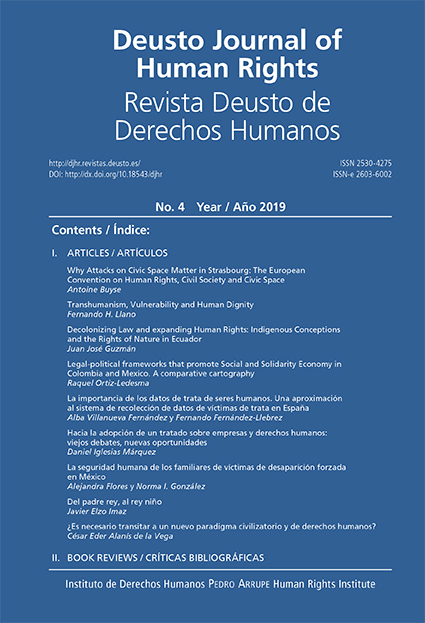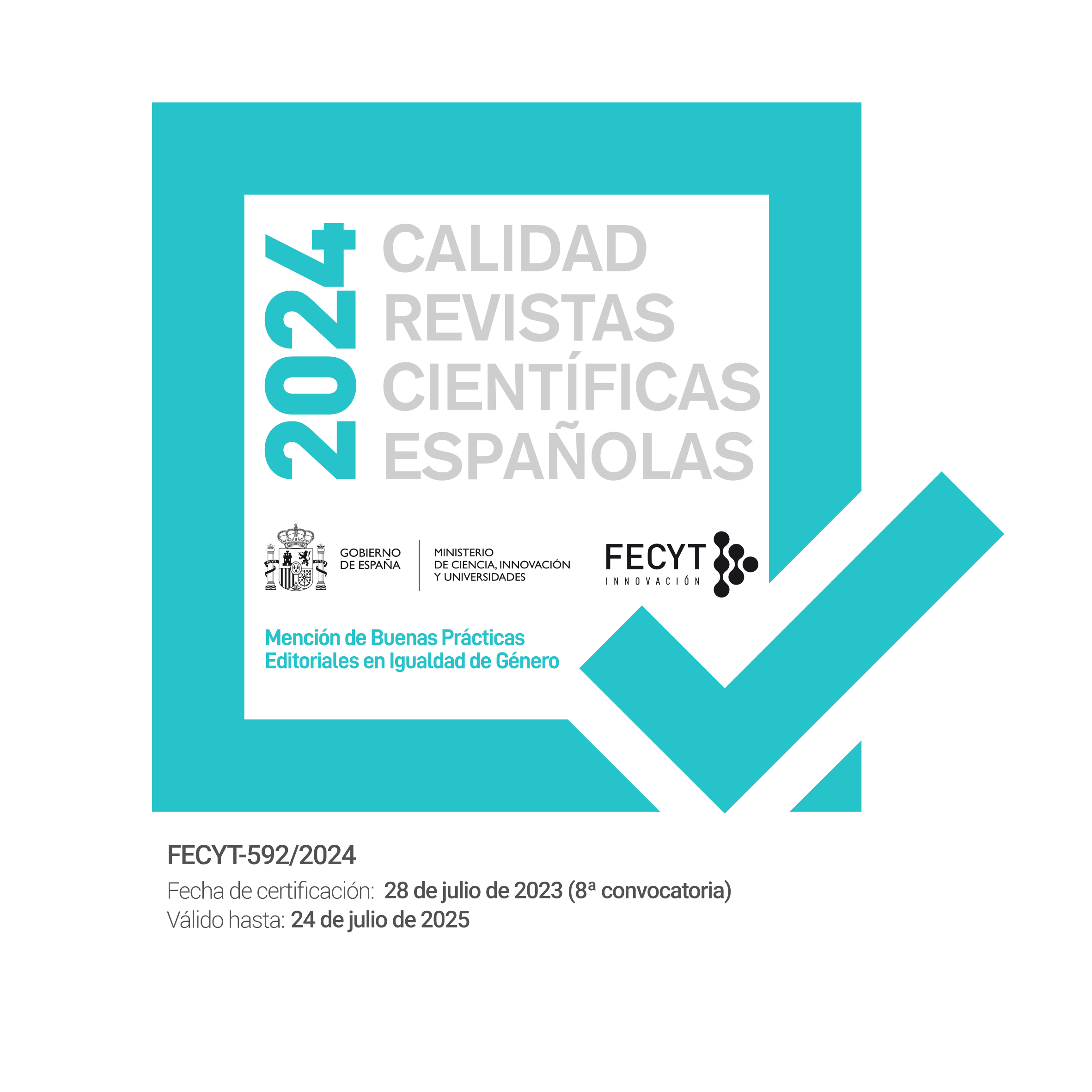Por qué los ataques al espacio cívico son importantes en Estrasburgo: el Convenio Europeo de Derechos Humanos, la sociedad civil y el espacio cívico
Resumen
Este artículo analiza el papel del Convenio Europeo de Derechos Humanos a la hora de abordar el tema de los ataques al espacio cívico, pero también los posibles efectos de la reducción del espacio cívico en el trabajo del Tribunal de Estrasburgo. Primero, se ofrece una visión general de las nociones de sociedad civil y espacio cívico, vinculándolas con la democracia y los derechos humanos. Posteriormente, se discuten los roles formales e informales de la sociedad civil en la toma de decisiones judiciales. Por último, se analiza la protección sustantiva ofrecida por el CEDH y la jurisprudencia del Tribunal Europeo de Derechos Humanos a la sociedad civil y al espacio cívico. Este artículo defiende que las diferencias teóricas sobre las diversas contribuciones de la sociedad civil a la democracia y los derechos humanos se reflejan en gran medida en la jurisprudencia de Estrasburgo. Más aún, el sistema del CEDH y la sociedad civil se refuerzan mutuamente. Esta es la razón por la que los ataques actuales al espacio cívico no son solo un problema para la sociedad civil, sino también para el trabajo del Tribunal Europeo: se considera por ello que una reducción del espacio cívico también puede afectar negativamente al sistema judicial de Estrasburgo, ya que ambos están estrechamente relacionados.
Recibido: 06 julio 2019
Aceptado: 10 octubre 2019
Publicación en línea: 20 diciembre 2019
Descargas
Citas
Anheier, Helmut K. 2004. Civil society. Measurement, evaluation, policy, London: Earthscan.
Bürli, Nicole. 2017. Third-party interventions before the European Court of Human Rights, Cambridge: Intersentia.
Buyse, Antoine. 2014. “Contested contours: the limits of freedom of expression from an abuse of rights perspective: Articles 10 and 17 ECHR”, in Shaping rights in the ECHR. The role of the European Court of Human Rights in determining the scope of human rights, edited by E. Brems and J. Gerards, 183-208, Cambridge: Cambridge University Press.
Buyse, Antoine. 2018. “Squeezing civic space: restrictions on civil society organizations and the linkages with human rights”, The International Journal of Human Rights, 22 (8): 966-988, DOI: doi.org/10.1080/13642987.2018.1492916
Carothers, Thomas, and Brechenmacher, Saskia. 2014. Closing space: Democracy and Human Rights support under fire, Washington DC: Carnegie Endowment for International Peace, Accessed June 19, 2019. http://www.carnegieendowment.org/files/closing_space.pdf
Centre for Civil Society. 2006. Report on activities July 2005-August 2006, London: The London School of Economics and Political Science, Accessed June 19, 2019. http://eprints.lse.ac.uk/29398/1/CCSReport05_06.pdf
Cichowski, Rachel. 2010. Civil society and the European Court of Human Rights, APSA Annual Meeting Paper. Accessed June 19, 2019. https://ssrn.com/abstract=1643604
CIVICUS. 2018. People power under attack. A global analysis of threats to fundamental freedoms Accessed June 9, 2019. https://www.civicus.org/documents/PeoplePowerUnderAttack.Report.27November.pdf
Coelho, Letícia. 2017. “Infographics: Civic space explained”, Sur International Journal on Human Rights, 14 (26): 193-197.
Cooper, R. 2018. What is civil society? How is the term used and what is seen to be its role and value (internationally) in 2018? K4D Helpdesk Report, Brighton, UK: Institute of Development Studies. Accessed June 19, 2019. https://opendocs.ids.ac.uk/opendocs/bitstream/handle/123456789/14242/488_What_is_Civil_Society.pdf?sequence=1&isAllowed=y
Chambers, S., and Kopstein, J. 2001. “Bad civil society”, Political Theory, 29: 837-865.
Edwards, Michael. 2011. “Introduction: Civil society and the geometry of human relations” in The Handbook of Civil Society, edited by Michael Edwards, 3-14 Oxford: OUP.
Edwards, Michael. 2014. Civil Society, 3rd edition, Cambridge: Polity Press.
European Court of Human Rights. 2013. Article 11: The conduct of public assemblies in the Court’s case-law. Accessed June 19, 2019. https://www.echr.coe.int/Documents/Public_assemblies_ENG.pdf
European Court of Human Rights. 2016. Rapport de recherché. Les organisations non gouvernementales dans la jurisprudence de la Cour européenne des droits de l’homme. Accessed June 19, 2019. https://www.echr.coe.int/Documents/Research_report_NGOs_FRA.pdf
European Court of Human Rights. 2018. Guide on Article 18 of the European Convention on Human Rights - Limitation on use of restrictions on rights. Accessed June 19, 2019. http://www.echr.coe.int/Documents/Guide_Art_18_ENG.pdf
Glasius, Marlie. 2016. “Civil and uncivil society”, The Blackwell Encyclopedia of Sociology online, Accessed June 19, 2019. https://doi.org/10.1002/9781405165518.wbeos0714
Human Rights Watch. 2016. World Report 2016: How the Politics of Fear and the Crushing of Civil Society Imperil Global Rights. Accessed June 19, 2019. http://www.hrw.org
Human Rights Watch. 2018. “Russia: Chechen leader threatens human rights defenders”, The Guardian, 28 August. Accessed June 19, 2019. http://www.theguardian.com
Lettinga, Doutje & Kaulingfreks, Femke. 2015. “Clashing activisms: International human rights organizations and unruly politics”, Journal of Human Rights Practice, 7 (3): 343-365, Accessed June 19, 2019. https://doi.org/10.1093/jhuman/huv015
McIntosh Sundstrom, Lisa. 2014. “Russian NGOs and the European Court of Human Rights: A spectrum of approaches to litigation”, Human Rights Quarterly, 36: 844-868.
Steering Committee for Human Rights (CDDH). 2018. Drafting group on civil society and national human rights institutions, 8 February, CDDH-INST(2018)02, Accessed June 19, 2019. https://rm.coe.int/steering-committee-for-human-rights-cddh-drafting-group-on-civil-socie/1680787474
Tan, Floris. 2018. “The dawn of Article 18 ECHR: A safeguard against European rule of law backsliding?”, Goettingen Journal of International Law, 9 (1): 109-141.
The Guardian. 2019. “Court in Chechnya banishes human rights activist to penal colony”, The Guardian 19 March. Accessed June 19, 2019. http://www.theguardian.com
The Moscow Times. 2016. “Rights group memorial declared «foreign agent»” (for criticizing law about «foreign agents»)’, 4 October. Accessed June 19, 2019. http://www.themoscowtimes.com
Unmüßig, Barbara. 2016. Civil society under pressure – shrinking – closing – no space Berlin: einrich Böll Foundation. Accessed June 19, 2019. http://www.boell.de
Van der Borgh, Chris, and Carolijn Terwindt. 2014. NGOs under pressure in partial democracies, Basingstoke: Palgrave Macmillan.
Warren, Mark E. 2011. “Civil society and democracy”, in The Handbook of Civil Society, edited by Michael Edwards, 377-390, Oxford: OUP.
Wischermann, Jörg, Bettina Bunk, Patrick Köllner and Jasmin Lorch. 2018. “Do associations support authoritarian rule? Evidence from Algeria, Mozambique, and Vietnam”, Journal of Civil Society, 14 (2): 95-115.
World Economic Forum (WEF). 2013. The future role of civil society. Accessed June 19, 2019. http://www3.weforum.org/docs/WEF_FutureRoleCivilSociety_Report_2013.pdf
Youngs, Richard and Ana Echagüe. 2017. Shrinking space for civil society: EU Response, Brussels: European Parliament. Accessed June 19, 2019. http://www.europarl.europa.eu/RegData/etudes/STUD/2017/578039/EXPO_STU(2017)578039_EN.pdf
Deusto Journal of Human Rights / Revista Deusto de Derechos Humanos es una revista de Acceso Abierto; lo que significa que es de libre acceso en su integridad inmediatamente después de la publicación de cada número. Se permite su lectura, la búsqueda, descarga, distribución y reutilización en cualquier tipo de soporte sólo para fines no comerciales y según lo previsto por la ley; sin la previa autorización de la Editorial (Universidad de Deusto) o la persona autora, siempre que la obra original sea debidamente citada (número, año, páginas y DOI si procede) y cualquier cambio en el original esté claramente indicado. Cualquier otro uso de su contenido en cualquier medio o formato, ahora conocido o desarrollado en el futuro, requiere el permiso previo por escrito de la persona titular de los derechos de autoría.



3.jpg)
3.jpg)
3.jpg)
.jpg)








